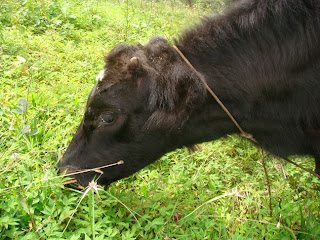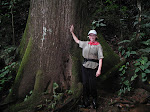 Little Gerry (the calf) was born on Big Gerry’s (the husband’s) birthday last March. Big Gerry had originally destined Little Gerry for the freezer and thus, for the past 18 months, the calf has been living an idyllic, pastoral life until the day would come when… “You won’t even know what’s happening, Little Gerry”….thwack. However, this is Costa Rica, and so the long saga began. Thank you everyone for all the logistics help related to a 4H-approach to knowing where your food comes from: certifications, timbres, refrigerated transport to hygienic facility, professional butcher, vacuum sealing and, voila – ready for the freezer.
Little Gerry (the calf) was born on Big Gerry’s (the husband’s) birthday last March. Big Gerry had originally destined Little Gerry for the freezer and thus, for the past 18 months, the calf has been living an idyllic, pastoral life until the day would come when… “You won’t even know what’s happening, Little Gerry”….thwack. However, this is Costa Rica, and so the long saga began. Thank you everyone for all the logistics help related to a 4H-approach to knowing where your food comes from: certifications, timbres, refrigerated transport to hygienic facility, professional butcher, vacuum sealing and, voila – ready for the freezer. But, “What were we thinking???”
We don’t even have a freezer with the capacity for Little Gerry! We are 100% Solar Power. And what really made us question our sanity was this: we rarely eat red meat anyway – no matter how excellent the quality!
Why not keep Little Gerry as a pet? I learned that lesson the hard way. Bovines are not equines! They are a lot more trouble! The short answer is to read the book: “A Naturalist on a Tropical Farm”, by Alexander Skutch. I read his warning on keeping bovines – the flies, the torsalos, the broken fencing. Cows are vagabonds – but did I heed his warning? Of course not; ‘stupid me’ had to learn my own lesson the hard way. Of course, nowadays we have modern methods for controlling pests, as well as traditional ones – like stable hens chomping down on larvae and insects – but it’s a continuous battle to keep pests under control in the tropical forest. And we always have to think about resistance.
So what was I thinking? Well, things always have a way of cascading. We just planned on keeping one cow, Lola La Vaca, for her milk, and we just vaguely, kind-of, destined her future calves for the freezer. We didn’t really think much about the how and the why until we got started with the logistics. And that’s when the saga began. Little Gerry was Lola La Vaca’s second calf and, at the time, I was really keen on making our own cheese and yoghurt. So we were just beginning to experiment with her natural bacteria for cheese-making when she died. Much to our shock, she died from an infection, a week after the traumatic, caesarean delivery of her third calf, stillborn, on Easter Sunday.
And that put an end to bovine cheese-making! I thought briefly about goats – goat yoghurt is wonderful – but right now I’m taking a break from animal husbandry - and home-made, milk-based products! Now I’m taking the path of least resistance and staying with organic gardening and just doing battle in the plant world. Biodiversity is the key to organic gardening in the tropics: mix many plants together; include lots of pest-attracting natives, like Tuete; and go with the flow. Stick with plants that thrive and don’t slave over plants not suited for the location or that require too many resources to keep alive.
Some weeks ago, back when I was feeling a bit glum about having to give up on yoghurt pro-biotics, fellow gardener, Hugo Zuniga, introduced me to plant pro-biotics: Water Kefir, gelatinous masses of beneficial bacteria and yeasts (also called Japanese Water Crystals, Ginger Beer Plant, Snow Lotus, Tibicos and other names). I had lots of fun playing with recipes – trying to make it more palatable, so that somebody besides just me would drink it, but nobody really liked it - except the ants, which just love tapa dulce and completely invaded the kitchen! So now Yaneth is grumpy and the Water Kefir is in our little freezer.
We haven’t completely eliminated animals, however! The horses have adapted very well to forest-living and, now that the guys have built a proper enclosure for our chickens, they have begun to breed and thrive. It’s fascinating to watch chickens – the protective mother, the pecking order. But then, I’ve been observing insects lately – even having conversations with them, “Stay off my basil”!
Insects are the big problem here in the tropical garden, not so much ‘weeds’. I’m currently reading this book about Weeds, by Richard Mabey. He describes the correlation of weed behavior with human behavior: humans, by reducing biodiversity, enclosing the Commons, introducing mono-culture, and applying chemicals, allowed only the toughest plants to survive, irritate, vex and plague humankind; who are now determined to eradicate the pest that they helped to create! Mabey is a fun-to-read, botanical author like Michael Pollan; fun reading but with many insights. The weeds we have in the tropics are mostly exotics that escaped from gardens, although the Pro-Nativa organization has recently been quite effective in guiding Costa Rican gardeners to plant native plants, rather than foreign ones.
So, the upshot is, we have no freezer for Little Gerry. Do you want to buy Little Gerry for your freezer? He is a natural grass-fed animal, who is in very good condition, unlike most cattle in this country. Big Gerry is very unhappy about this but has agreed that it makes most sense to sell him – even though he threatened to put me in the freezer for prematurely whetting his appetite…


1 comment:
I want to liberate little Gerry and am wondering how he will fare amidst washington politics ..it's a tough town . However what joy to feel connected again to Costa Rica through LJ. Miss you ..visit us soon r and b
Post a Comment